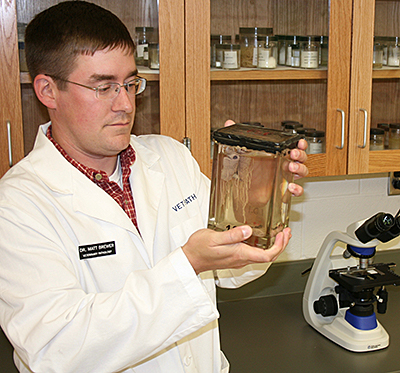
Dr. Matt Brewer seemed genuinely surprised by the question.
“Why wouldn’t I be interested in parasites, isn’t everyone,” he asks? “I just don’t understand people who aren’t interested in parasites.”
Brewer says his interest in “creepy, crawly things” started at a young age. “I was that kid who brought snakes to school because I thought everyone would be interested in them.”
Brewer has cultivated his interest in parasites into a career. Now an assistant professor of veterinary pathology in the College of Veterinary Medicine, he works daily with parasites. His office is “decorated” with examples various parasites he has collected over the years, the jars lining shelves. He casually plucks them off the shelf and speaks about his fascination with this worm or that worm that previously inhabited a cow, dog or hog.
As you can imagine, parasites are a constant concern for veterinarians.
“All practicing veterinarians deal with parasites everyday,” Brewer says. “A small animal practitioner talks to clients about deworming or flea control and heartworm prevention on a regular basis. Deworming is a daily conversation for equine vets and food animal veterinarians are constantly combating parasites that impede the health and wellbeing of production animals.”
“Every animal has a parasite that is significant to its general health and welfare.”
But not every parasite has long-lasting effects on animals or humans for that matter.
“We can’t totally eliminate all parasites, but our goal is to prevent disease associated with these organisms, Brewer said. “This involves a combination of strategic drug use and various strategies used to disrupt parasite life cycles.”
In the last year, Brewer’s work with parasites has yielded a number of achievements.
- He was awarded a new parasitology residency established through a $200,000 grant from the National Center for Veterinary Parasitology. The first recipient of the residency is Dr. Jeba Jesudoss Chelladurai, a current graduate student in the Department of Veterinary Pathology. The National Center for Veterinary Parasitology is collaboration between industry and academia with a mission to support education, particularly in training graduate veterinarians in parasitology research and diagnostics. “Parasitology is especially relevant to the ‘One Health’ mission and relatively few veterinarians specialize in this area,” Brewer said.
- He passed the board certification examination in veterinary parasitology and is now a Diplomate of the American College of Veterinary Microbiology in the specialty of parasitology. Brewer is the only CVM professor with ACVM diplomate status with a parasitology specialty.
- His article, “Molecular Epidemiology of Ascaris Infection Among Pigs in Iowa,” was published in the prestigious Journal of Infectious Diseases. Ascaris is a large roundworm parasite that infects humans and pigs throughout the world. Brewer, Chelladurai and his research team collected the first genetic evidence describing zoonotic transmission of the parasite among humans and pigs in the United States.
The eggs of this particular roundworm parasite are ingested and the larvae migrate in the liver and lungs prior to being coughed up and swallowed. The adult worms live in the small intestine and are impressive in size, growing up to 12 inches in length.
In pigs, infection can depress the immune system and the migrating larval stages can predispose animals to secondary viral and bacterial pathogens. The eggs can live for years and Ascaris remains a problem, even in animals confined indoors. Humans can become infected if they accidentally ingest the eggs that are passed in feces.
“Our results indicate that anthropozoonotic transmission has occurred in the past, resulting in the presence of human genotypes in pigs,” Brewer writes. “This further supports investigation of zoonotic Ascaris transmission in the United States.”
And despite his love of parasites, deep down, Brewer realizes even the world “parasite” has a bad connotation among the public.
“Most people are repulsed by parasites,” he said, “but we have lived side by side with them for a long time and that’s going to continue.”
May 2017
